Mises, Ludwig von. Human Action: A Treatise on Economics
Подождите немного. Документ загружается.

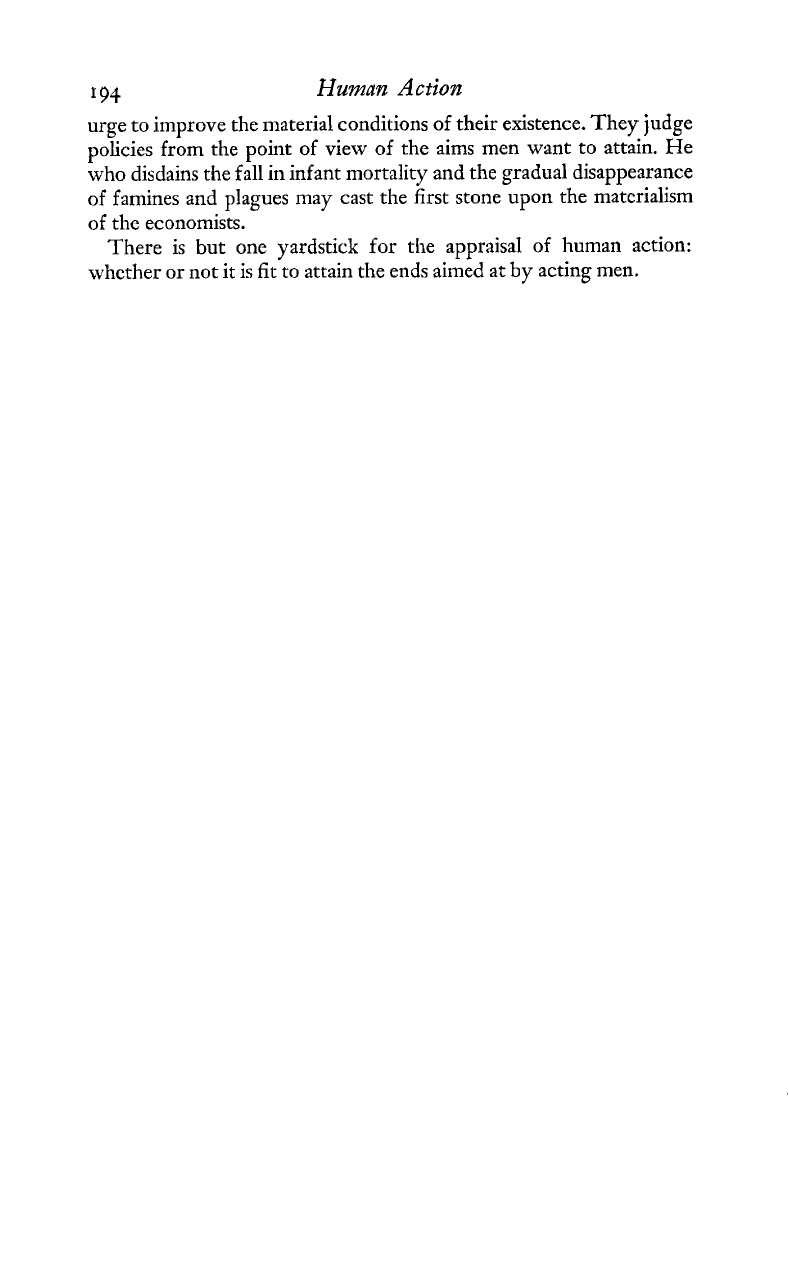
194
Human
Action
urge to improve the material conditions of their existence. They judge
policies from
the
point of view of the aims men want to attain.
He
who disdains the fall in infant mortality and the gradual disappearance
of famines and plagues may cast the first stone upon the materialism
of the economists.
There is but one yardstick for the appraisal of human action:
whether or not it
is
fit
to attain the ends aimed at
by
acting men.
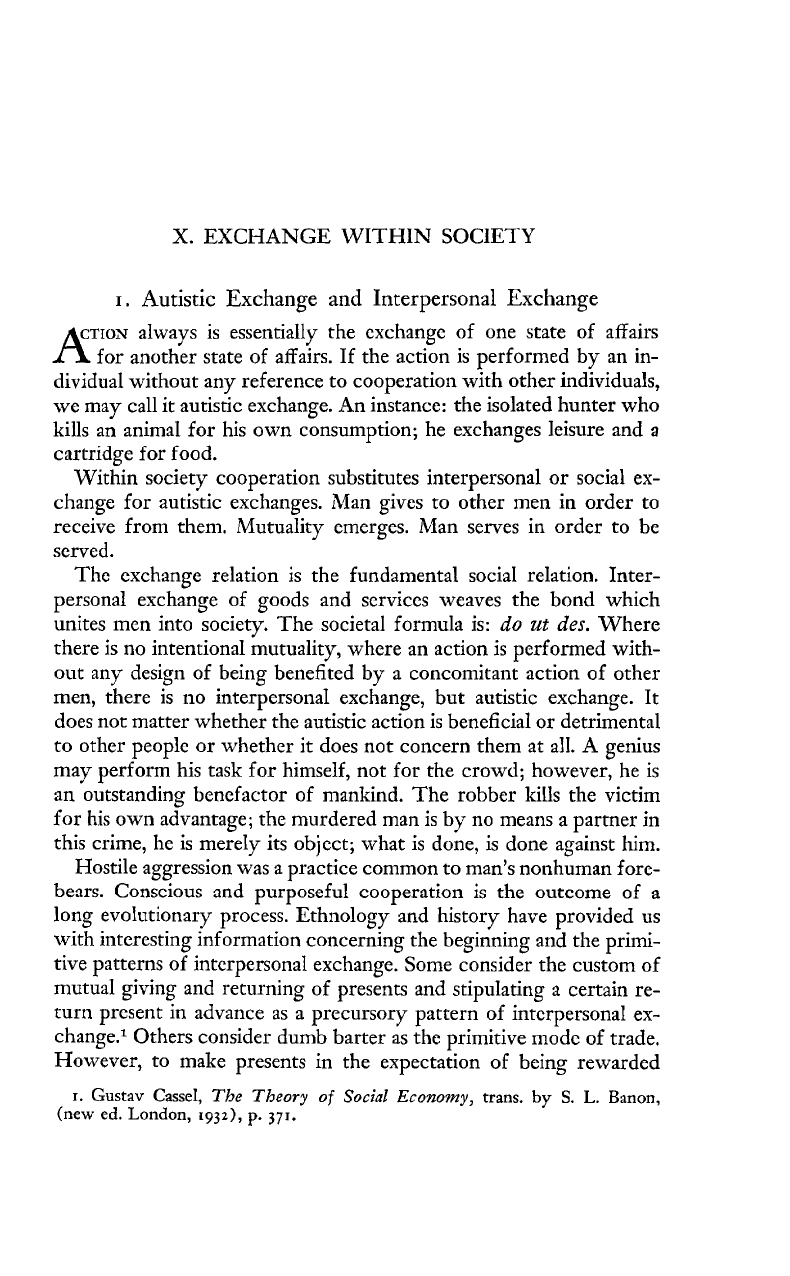
X.
EXCHANGE WITHIN SOCIETY
I.
Autistic Exchange and Interpersonal Exchange
CTION
always is essentially the exchange of one state of affairs
A
for another state of affairs. If the action is performed by an in-
dividual without any reference to cooperation with other individuals,
we may call it autistic exchange. An instance: the isolated hunter who
kills an animal for his own consumption; he exchanges leisure and
a
cartridge for food.
Within society cooperation substitutes interpersonal or social ex-
change for autistic exchanges. Man gives to other men in order to
receive from them. Mutuality emerges. Man serves in order to be
served.
The exchange relation is the fundamental social relation. Inter-
personal exchange of goods and services weaves the bond which
unites men into society. The societal formula is:
do
ut
des.
Where
there is no intentional mutuality, where an action is performed with-
out any design of being benefited by a concomitant action of other
men, there is no interpersona1 exchange, but autistic exchange. It
does not matter whether the autistic action is beneficial or detrimental
to other people or whether it does not concern them at alI. A genius
may perform his task for himself, not for the crowd; however, he is
an outstanding benefactor of mankind. The robber kills the victim
for his own advantage; the murdered man is by no means
a
partner in
this crime, he is mereIy its object; what is done, is done against him.
Hostile aggression was a practice common to man's nonhuman fore-
bears.
Camciaus
ad
pnrpeseh!
cmperatiy
is
the
mtc=me
~f
2
long evolutionary process. Ethnology and hlstory have provided us
with interesting information concerning the beginning arid the primi-
tive patterns of interpersonal exchange. Some consider the custom of
mutual giving and returning of presents and stipulating a certain re-
turn present in advance as a precursory pattern of intcrpersonal ex-
change.l Others consider dumb barter as the primitive mode of trade.
However, to make presents in the expectation of being rewarded
r.
Gustav
Cassel,
The Theory of Social Economy,
trans.
by
S.
L.
Banon,
(new
ed.
London,
~9321,
p.
371.
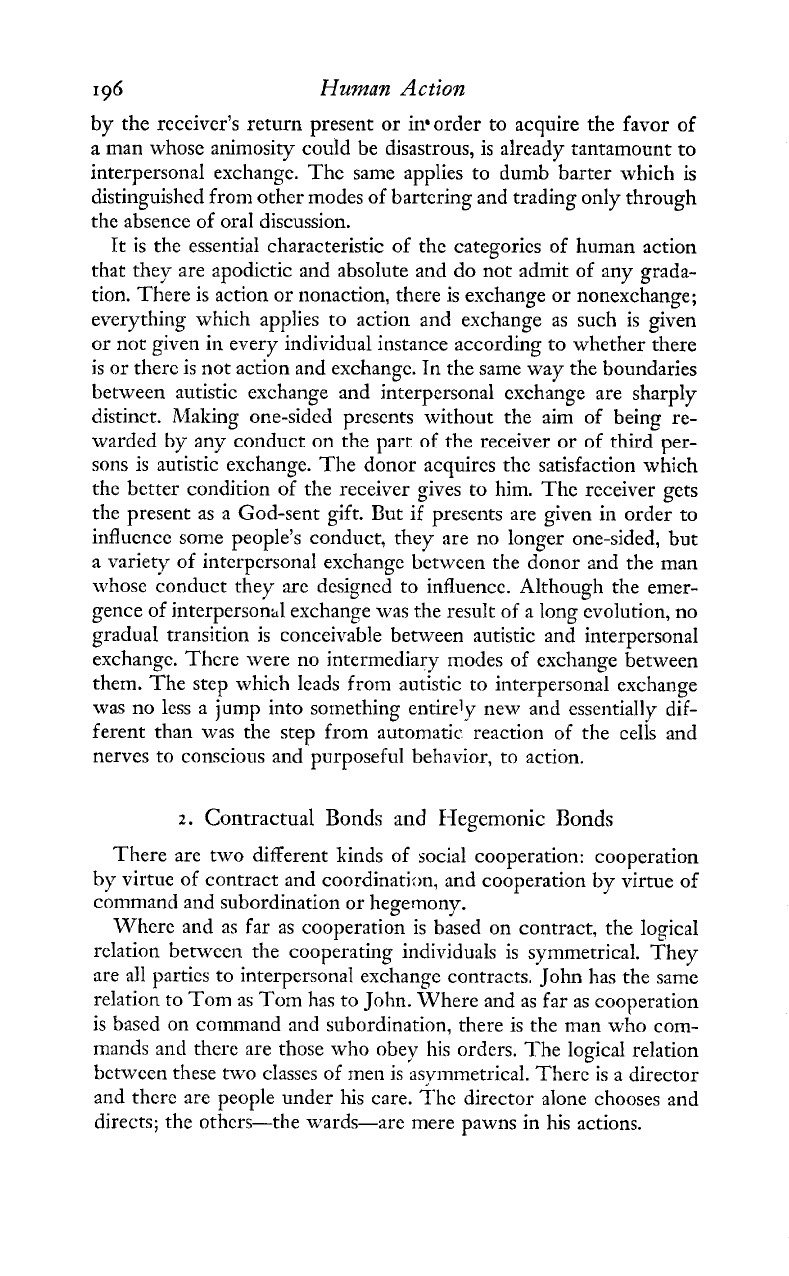
Human
Action
by the receiver's return present or insorder to acquire the favor of
a
man whose animosity could be disastrous, is already tantamount to
interpersonal exchange. The same applies to dumb barter which is
distinguished from other modes of bartering and trading only through
the abscnce of oral discussion.
It is the essential characteristic of the categories of human action
that they are apodictic and absolute and do not admit of any grada-
tion. There is action or nonaction, there is exchange or nonexchange;
everything which applies to action and exchange as such is given
or not given in every individual instance according to whether there
is or there is not action and exchange. In the same way the boundaries
between autistic exchange and interpersonal cxchange are sharply
distinct. Making one-sided presents without the aim of being re-
warded by any conduct on the part of the receiver or of third per-
sons is autistic exchange.
The
donor acquires the satisfaction which
the better condition of the receiver gives to him. The receiver gets
the present as a God-sent gift. But if presents are given in order to
influence
some people's conduct, they are no longer one-sided, but
a variety of interpersonal exchange between the donor and the man
whose conduct they are designed to influence. Although the emer-
gence of interpersonal exchange was the result of a long evolution, no
gradual transition is conceivable between autistic and interpcrsonal
exchangc. There were no intermediary modes of exchange between
them. The step which leads from autistic to interpersonal exchange
was no less a jump into something entirely new and essentially dif-
ferent than was the step from automatic reaction of the cells and
nerves to conscious and purposeful behavior, to action.
2.
Contractual
Bonds
and
E-Tegcmonic Bonds
There are two different kinds of social cooperation: cooperation
by virtue of contract and coordinatim, and cooperation by virtue of
command and subordination or hegemony.
Wherc and as far as cooperation is based on contract, the logical
relation betwccn the cooperating individuals is symmetrical. They
are all parties to interpersonal exchange contracts. John has the same
relation to Tom as Tom has to John. Where and as far as cooperation
is based on command and subordination, there is the man who com-
mands and there are those who obey his orders. The logical relation
between these two classes of men is asymmetrical. There is a director
and there are people under his care. The director alone chooses and
directs; the others-the wards-are mere pawns in his actions.
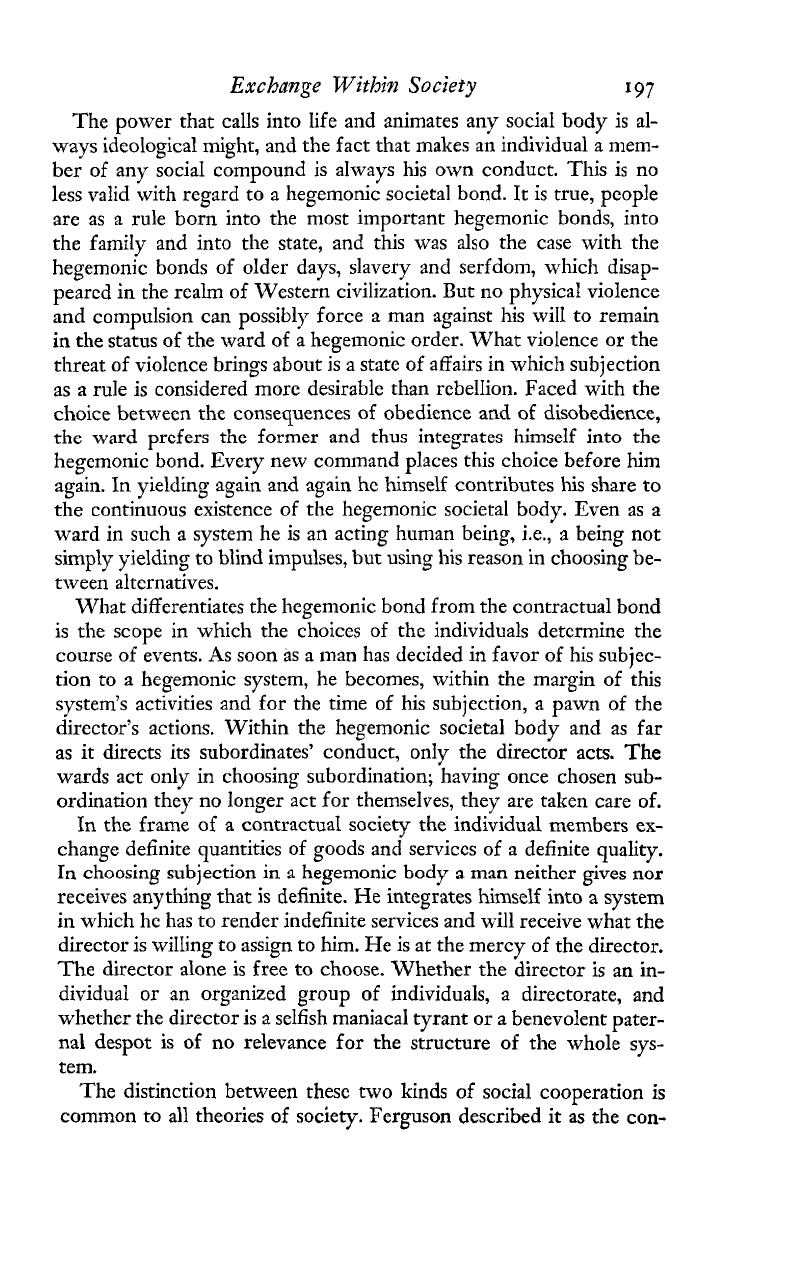
Exchange Within Society
1
97
The power that calls into life and animates any social body is al-
ways ideological might, and the fact that makes an individual a mem-
ber of any socia1 compound is always his own conduct. This is no
less valid with regard to a hegemonic societal bond. It is true, people
are as a rule born into the most important hegemonic bonds, into
the family and into the state, and this was also the case with the
hegemonic bonds of older days, slavery and serfdom, which disap-
peared in the realm of Western civilization. But no physical violence
and compulsion can possibly force a man against his wiII to remain
in the status of the ward of a hegemonic order. What violence or the
threat of violcnce brings about is a state of affairs in which subjection
as a rule is considered more desirable than rebelIion. Faced with the
choice between the consequences of obedience and
of
disobedience,
the ward prefers the former and thus integrates himself into the
hegemonic bond. Every new command places this choice before him
again.
In
yielding again and again he himself contributes his share to
the continuous existence of the hegemonic societal body. Even as a
ward in such a system he is an acting human being, i.e., a being not
simply yielding to blind impulses, but using
his
reason in choosing be-
tween alternatives.
What differentiates the hegemonic bond from the contractual bond
is the scope in which the choices of the individuals detcrmine the
course of events. As soon as
a
man has decided in favor of his subjec-
tion to a hegemonic system, he becomes, within the margin of this
system's activities and for the time of his subjection, a pawn of the
director's actions. Within the hegemonic societal body and as far
as
it
directs its subordinates' conduct, only the director acts.
The
wards act only in choosing subordination; having once chosen sub-
ordination they no longer act for themselves, they are taken care of.
In the frame of a contractuaI society the individual members ex-
change definite quantities of goods and services of a definite quality.
In choosing subjection in
a
hegemonic body a man neither gives nor
receives anything that is definite.
He
integrates himself into a system
in which he has to render indefinite services and will receive what the
director is wilIing to assign to him. He is at the mercy of the director.
The director alone is free to choose. Whether the director is an in-
dividual or an organized group of individuals, a directorate, and
whether the director is a selfish maniacal tyrant or a benevolent pater-
nal despot is of no relevance for the structure of the whole sys-
tem.
The distinction between these two kinds of social cooperation
is
common to all theories of society. Ferguson described it as the con-
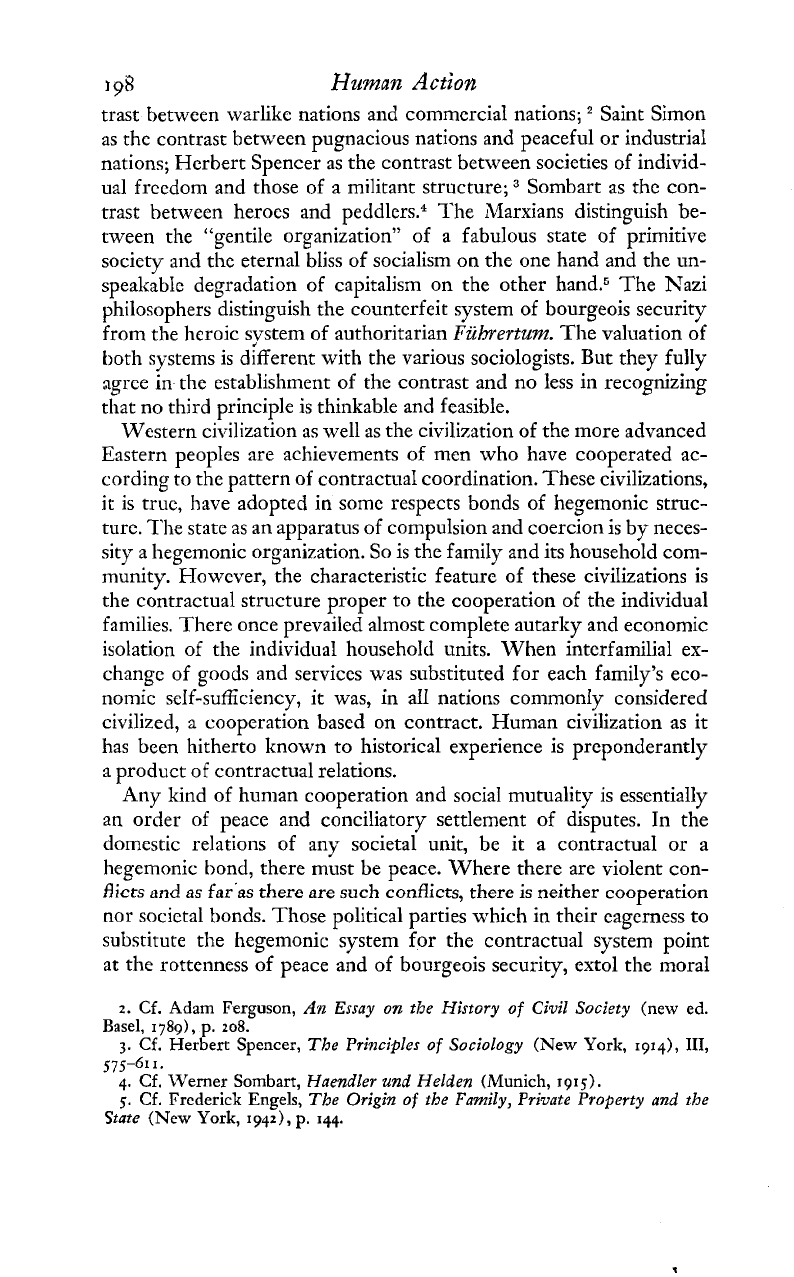
I
98
Human
Actiolz
trast between warlike nations and commercial nations; Saint Simon
as the contrast between pugnacious nations and peaceful or industrial
nations; Herbert Spencer as the contrast between societies of individ-
ual frccdom and those of a militant structure; Sombart as the con-
trast between heroes and
peddler^.^
The Marxians distinguish be-
tween the "gentile organization" of a fabulous state of primitive
socicty and the eternal bliss of socialism on the one hand and the nn-
speakable degradation of capitalism on the other hand.The hTazi
philosophers distinguish the counterfeit system of bourgeois security
from the heroic system of authoritarian
I;iihrertum.
The valuation of
both systems is different with the various sociologists. But they fully
agree in the establishment of the contrast and no less in recognizing
that no third principle is thinkable and feasible.
Western civilization as well as the civilization of the more advanced
Eastern peoples are achievements of men who have cooperated ac-
cording to the pattern of contractuaI coordination. These civilizations,
it is true, have adopted in some rcspects bonds of hegemonic struc-
ture. The state as an apparatus of compulsion and coercion is by neces-
sity a hegemonic organization. So is the family and its household com-
munity. Howcver, the characteristic feature of these civiIizations is
the contractual structure proper to the cooperation of the individual
families. There once prevailed almost complete autarky and economic
isolation of the individual household units. When interfamilial ex-
change of goods and services was substituted for each family's eco-
nomic seIf-sufficiency, it was, in a11 nations commonIy considered
civilized,
a
cooperation based on contract. Human civilization as it
has been hitherto known to historical experience is preponderantly
a product of contractual relations.
Any kind of human cooperation and social mutuality is
essentially
an order of peace and conciliatory settlement of disputes. In the
domestic relations of any societal unit, be it a contractual or a
hegemonic bond, there must be peace. Where there are violent con-
flicts and as far'as there are such conflicts, there is neither cooperation
nor socictal bonds. Those political parties which in their eagerness to
substitute the hegemonic system for the contractual system point
at the rottenness of peace and of bourgeois security, extol the moral
2.
Cf.
Adam Ferguson,
An Essay on the History of Civil Society
(new ed.
Basel, 1789), p. 208.
3.
Cf.
Herbert Spencer,
The Principles of Sociology
(New York, 1914)~
111,
575-61 I.
4.
Cf.
Werner Sombart,
Haendler und Helden
(Munich, 1915).
5.
Cf.
Frederick Engels,
The Origin of the Family, Private Property and the
State
(New York, 1942).
p.
144.
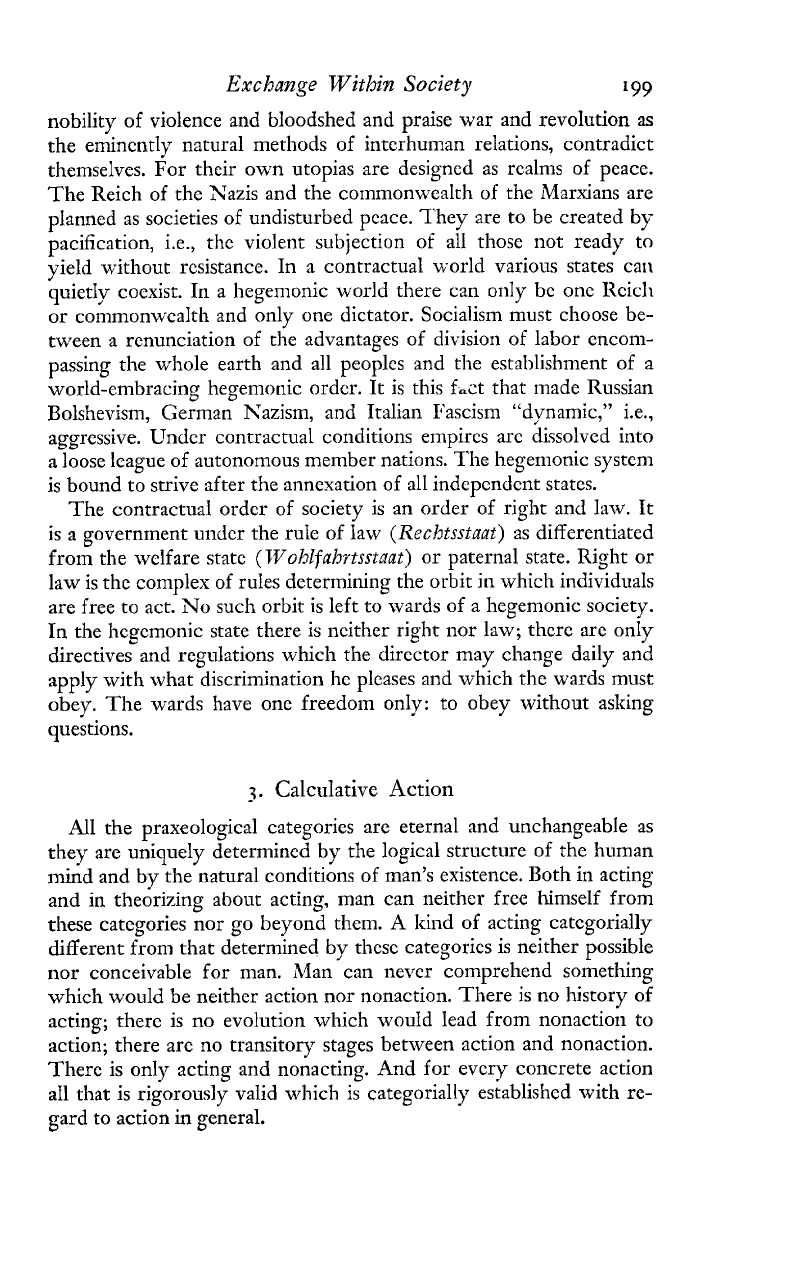
Exchange Within Society
'99
nobility of violence and bloodshed and praise war and revolution
as
the emincntly natural methods of intcrhuman relations, contradict
themselves. For their own utopias are designed as realms of peace.
The Reich of the Xazis and the co~n~nonwcalth of the Marxians are
planncd as societies of undisturbed pcace. They are to be created
by
pacification, i.e., the violent subjection of all those not ready to
yield without rcsistance. In
a
contractual world various states can
quietly coexist. In a hegemonic world there can only be one Reich
or commonwcalth and only one dictator. Socialism must choose be-
tween a renunciation of the advantages of division of labor encom-
passing the whole earth and all peoples and the establishment of a
world-crnbracing hegemonic order. It is this fact that made Russian
Bolshevism, German Nazism, and Italian Fascism "dynamic," i.e.,
aggressive. Undcr contractual conditions empircs arc dissolved into
a loose Icague of autonomous member nations. The hegemonic system
is bound to strive after the annexation of all indepcndcnt states.
The contractual order of society is an order of right and
law.
It
is
a
government undcr the rule of law
(Rechtsstaat)
as differentiated
from the wclfare state
(Wohlfahtsstnat)
or paternal state. Right or
law is the complex of rules determining the orbit in which individuals
are free to act. No such orbit is left to wards of
a
hegemonic society.
In the hegemonic state there is ncither right nor law; there are only
directives and regulations w-hich the director may change daily and
apply with what discrimination he pleases and which the wards must
obey. The wards have one freedom only: to obey without asking
questions.
3.
Calculative Action
All the praxeological categories are eternal and unchangeable as
they are uniquely determined by the logical structure of the human
mind and
by
the natural conditions of man's existence. Both in acting
and in theorizing about acting, man can neither free himself from
these categories nor go beyond them. A kind of acting categorially
different from that determined by thesc categories is neither possible
nor conceivable for man. Man can never comprehend something
which would be neither action nor nonaction. There is no history of
acting; thcrc is no evolution which wouId lead from nonaction to
action; there arc no transitory stages between action and nonaction.
There is only acting and nonacting. And for evcry concrete action
all that is rigorously valid which is categorially established with re-
gard to action in general.
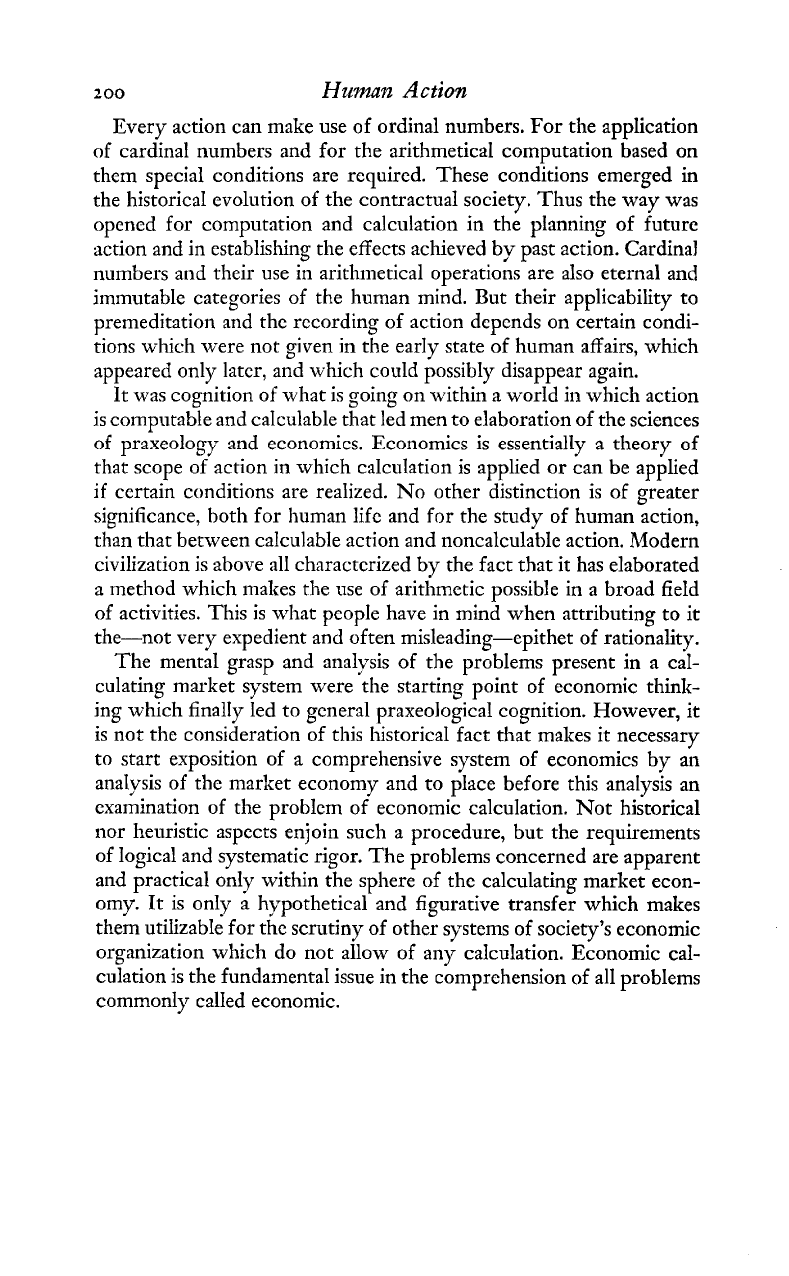
2
00
Human
Action
Every action can make use of ordinal numbers. For the application
of cardinal numbers and for the arithmetical computation based on
them special conditions are required. These conditions emerged in
the historicaI evolution of the contractual society. Thus the way was
opencd for computation and calculation in the planning of future
action and in establishing the effects achieved by past action. Cardinal
numbers and their use in arithmetical operations are also eternal and
immutable categories of the human mind. But their applicability to
premeditation and the rccording of action depcnds on certain condi-
tions which were not given in the early state of human affairs, which
appeared only later, and which could possibly disappear again.
It was cognition of what is going on within a world in which action
is computable and caIcrilable that led men to elaboration of the sciences
of praxeology and economics. Economics is essentially
a
theory of
that scope of action in which calculation is applied or can be applied
if
certain conditions are realized. No other distinction is of greater
significance, both for human life and for the study of human action,
than that between ca1culable action and noncalculable action. Modern
civilization is above all
characterized
by the fact that it has elaborated
a method which makes the use of arithmetic possible in a broad field
of activities. This is what people have in mind when attributing to it
the-not very expedient and often misleading-epithet of rationality.
The mental grasp and analysis of the problems present in a cal-
culating market system were the starting point of economic think-
ing which finally led to general praxeological cognition. However, it
is not the consideration of this historicaI fact that makes it necessary
to start exposition of
a
comprehensive system of economics by an
anaIysis of the market economy and to place before this analysis an
examination of the problem of economic calculation. Not historical
nor heuristic aspects enjoin such a procedure, but the requirements
of logical and systematic rigor. The problems concerned are apparent
and practical only within the sphere of the calculating market econ-
omy. It is only
a
hypothetical and figurative transfer which makes
them utilizab~d for the scrutiny of other systems of society's economic
organization which do not allow of any calculation. Economic cal-
culation is the fundamental issue in the comprehension of all problems
commonly called economic.
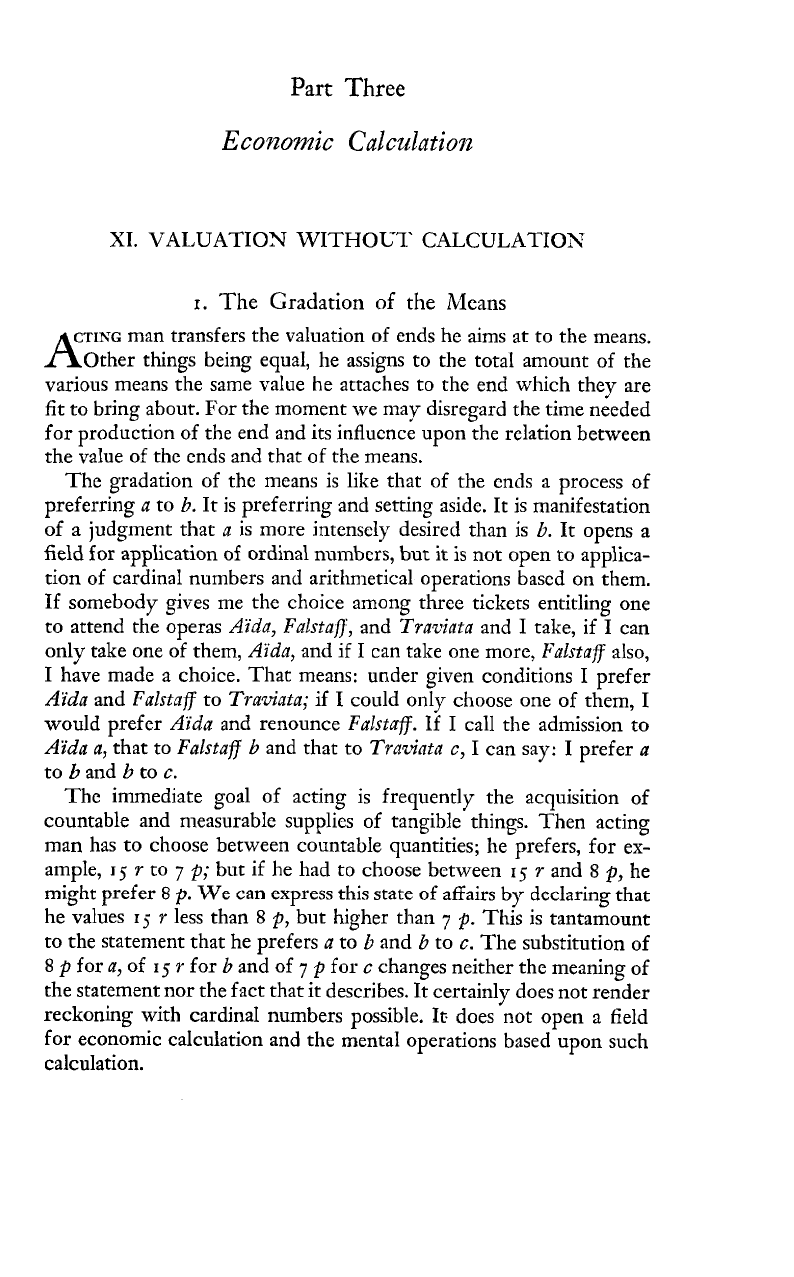
Part
Three
Economic Calczdation
XI. VALUATION WITHOUT CALCULATION
I.
The Gradation
of
the Means
CTING
man transfers the valuation of ends he aims at to the means.
A
Other things being equal, he assigns to the total amount of the
various means the same value he attaches to the end which they are
fit to bring about. For the moment we may disregard the time needed
for production of the end and its influence upon the relation between
the value of the ends and that of the means.
The gradation of the means is like that of the ends a process of
preferring
a
to
b.
It is preferring and settina aside. It is manifestation
9
of a judgment that
a
is more intensely desired than is
b.
It opens
a
field
for
application of ordinal numbers,
but
it is not open to applica-
tion of cardinal nurnbers and arithmetical operations based on them.
If somebody gives me the choice among three tickets entitling one
to attend the operas
Ai'da, Falstafl,
and
Traz'iata
and I take, if I can
only take one of them,
Ai'da,
and if I can take one more,
Falstaff
also,
I have made a choice. That means: under given conditions I prefer
Aida
and
Falstafl
to
Trauiata;
if
I
could only choose one of them,
I
would prefer
Ai'da
and renounce
Falstafl.
If I call the admission to
AYda a,
that to
Falstaff
b
and that to
Travinta c,
I
can say: I prefer
a
to
b
and
b
to
c.
The immediate goal of acting is frequently the acquisition of
countable and measurable supplies of tangible things. Then acting
man has to choose between countable quantities; he prefers, for ex-
ample, 15
r
to
7
p;
but if he had to choose between
I
5
r
and
8
p,
he
might prefer
8
p.
We can express this state of affairs
by
declaring that
he values
I
j
r
less than
8
p,
but higher than
7
p.
This is tantamount
to the statement that he prefers
a
to
b
and
b
to
c.
The substitution of
8
p
for
a,
of 15
r
for
b
and of
7
p
for
c
changes neither the meaning of
the statement nor the fact that it describes. It certainly does not render
reckoning with cardinal numbers possible.
It.
does not open a field
for economic calculation and the mental operations based upon such
calculation.

Human Action
2.
The
Barter-Fiction
of
the
Elementary Theory
of Value and Priccs
The elaboration of economic theory is heuristically dependent on
the logical
processes
of reckoning to such an extent that the econo-
mists failed to realize the fundamental problem involved in the
methods of economic calculation. They wcre prone to take economic
calculation as a matter of course; they did not see that it is not an
ultimate given, but a derivative
requiring
reduction to more elemen-
tary phenomena. They misconstrued economic calculation. They took
it for a category of all human action and ignored the fact that it is only
a
category inherent in acting under special conditions. They were
fuIly aware of the fact that interpersonal exchange, and consequently
market exchange effected hy the intermediary of a common medium
of exchange-money, and therefore prices, are special features of a
certain state of society's economic organization which did not exist in
primitive civilizations and could possibly disappear in the further
course of historical change.= But they did not comprehend that
money prices are the only vehicle of economic calculation. Thus most
of their studics are of little use. Even the writings of the most eminent
economists are vitiated to some extent by the fallacies implied in
their ideas about economic calculation.
'rhe modcrn theory of value and prices shows how the choices of
individuals, their preferring of some things and setting aside of other
things, result, in the sphcre of interpersonal exchange, in the emer-
gence of market
price^.^
These masterful expositions are unsatisfac-
tory in some minor points and disfigured by unsuitable expressions.
But they are essentially irrefutable. As far as they need to be amended,
it must he done by a consistent elaboration of the fundamental
thoughts of thcir authors rather than by a refutation of their reason-
iilg.
In order to trace back the phenomena of the marlret to the uni-
versal category of preferring
n
to
b,
the elementary theory of value
and prices is bound to use some imaginary constructions. The use of
imaginary constructions to which nothing corresponds in reality is
an indispensable tool of thinking. No other method would have con-
tributed anything to the interpretation of reality. But one of the most
I.
The Gcrman Historical School expressed this by asserting that private
ownership of the means of production, market exchange, and money are "his-
torical caterories."
2.
Cf.
es@cially Eugen von BGhm-Bawerk,
Kapital
and
Kapitalzins,
Pt.
11,
Bk.
111.
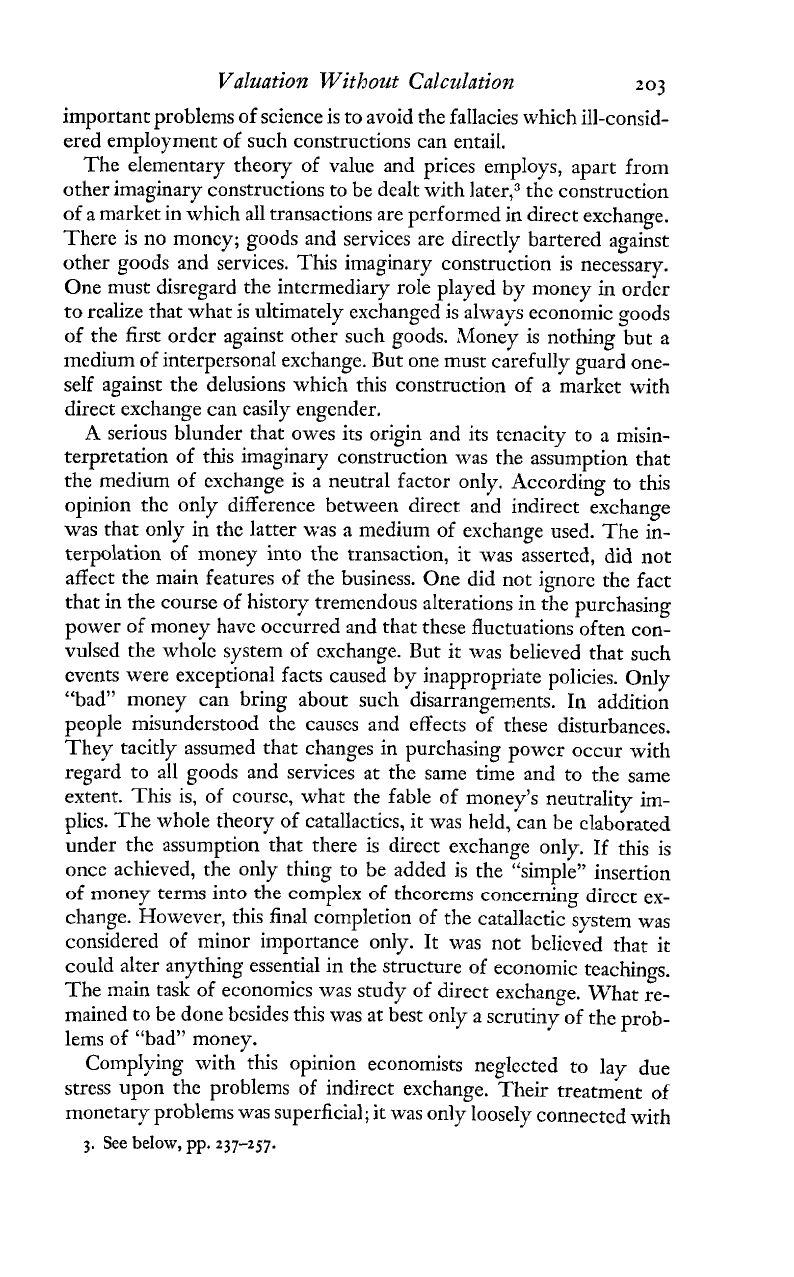
Valuation Without Calculation
203
important problems of science is to avoid the fallacies which ill-consid-
ered employment of such constructions can entail.
The elementary theory of value and prices employs, apart from
other imaginary constructions to be dealt with later,3 the construction
of a market in which all transactions are performed in direct exchange.
There is no money; goods and services are directly bartered against
other goods and services. This imaginary construction is necessary.
One must disregard the intermediary role played
by
money in order
to realize that what is ultimately exchanged is always economic goods
of the first order against other such goods. Money is nothing but a
medium of interpersonal exchange. But one must carefully guard one-
self against the delusions which this construction of a market with
direct exchange can easily engender.
A
serious blunder that owes its origin and its tenacity to
a
misin-
terpretation of this imaginary construction was the assumption that
the medium of exchange is a neutral factor only. According to this
opinion the only difference between direct and indirect exchange
was that only in the latter was a medium of exchange used. The in-
terpolation of money into the transaction, it was asserted, did not
affect the main features of the business. One did not ignore the fact
that in the course of history tremendous alterations in the purchasing
power of money have occurred and that these fluctuations often con-
vulsed the whole system of exchange. But it was believed that such
events were exceptional facts caused by inappropriate policies. Only
"bad" money can bring about such disarrangements. In addition
people misunderstood the causes and effects of these disturbances.
They tacitly assumed that changes in purchasing power occur with
regard to all goods and services at the same time and to the same
extent. This is, of course, what the fable of money's neutrality im-
plies. The whole theory of catallactics, it was held, can be elaborated
under the assumption that there is direct exchange only. If this is
once achieved, the only thing to be added is the "simple" insertion
of
money ternx into the complex of theorems concerning direct ex-
change. However, this final completion of the catallactic system was
considered of minor importance only. It was not believed that it
could alter anything essential in the structure of economic teachings.
The main task of economics was study of direct exchange. What re-
mained
to
be done besides this was at best only a scrutiny of the prob-
lems of "bad" money.
Complying with this opinion economists neglected to lay due
stress upon the problems of indirect exchange. Their treatment of
monetary problems was superficial; it was only loosely connectcd with
3.
See
below,
pp.
237-257.
